Unit 8 How was your school trip
Unit8_How_was_your_school_trip_1
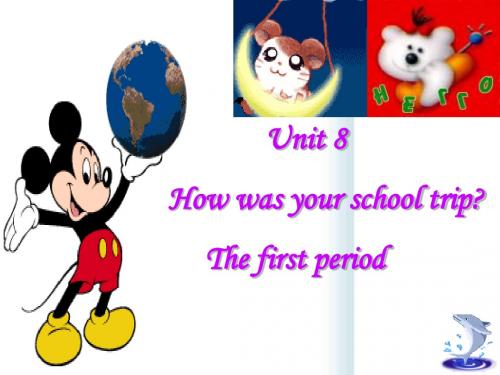
Unit 8
How was your school trip?
The first period
The rules of the past form
2
wanted needed decided lived improved
4
5
carry--carried study--studied worry—worried stop- stopped shop- shopped plan- planned go—went have--had see--saw
3
eat—ate buy–bought take–took win—won hang--hung
1b
动词过去式 went took 动词原形 go take have eat
had
ate
hung
saw
hang see
1、四人一组,分别介绍自己的上周末活动。 2、比一比谁的周末活动最精彩。
as作为.../当做... 接职业,用途,特点等。 放于句首。 后面有, eg:作为一名学生,我必须努力学习。
• 看见某人正在做某事
• see sb doing sth • 看见某人做了某事 • see sb do sth
根据汉语填空 1.我看见他正在打篮球。 I saw him playing _____basketball. 2.我看见他跑进了房间 run I saw her _____into the room.
As a student ,I must work hard.
• • • •
结果状语从句 如此。。。以至于。。。 so +adj/adv... that... 主语+adj/adv+enough to do sth可 互换 I was tired enough to sleep early.
unit8《howwasyourschooltrip》知识讲解及练习含答案(人教新目标初二上)doc初中英语
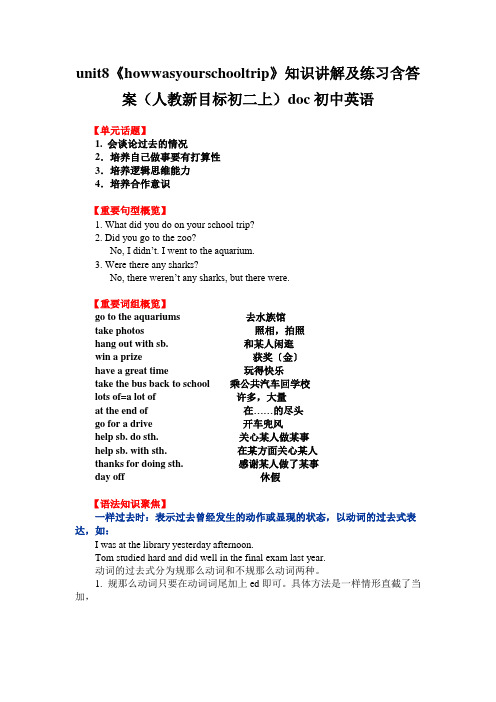
unit8《howwasyourschooltrip》知识讲解及练习含答案(人教新目标初二上)doc初中英语【单元话题】1. 会谈论过去的情况2.培养自己做事要有打算性3.培养逻辑思维能力4.培养合作意识【重要句型概览】1. What did you do on your school trip?2. Did you go to the zoo?No, I didn’t. I went to the aquarium.3. Were there any sharks?No, there weren’t any sharks, but there were.【重要词组概览】go to the aquariums去水族馆take photos照相,拍照hang out with sb.和某人闲逛win a prize获奖〔金〕have a great time玩得快乐take the bus back to school乘公共汽车回学校lots of=a lot of许多,大量at the end of在……的尽头go for a drive开车兜风help sb. do sth.关心某人做某事help sb. with sth.在某方面关心某人thanks for doing sth.感谢某人做了某事day off休假【语法知识聚焦】一样过去时:表示过去曾经发生的动作或显现的状态,以动词的过去式表达,如:I was at the library yesterday afternoon.Tom studied hard and did well in the final exam last year.动词的过去式分为规那么动词和不规那么动词两种。
1. 规那么动词只要在动词词尾加上ed即可。
具体方法是一样情形直截了当加,如:clean—cleaned;2. 词尾是不发音字母e的,可只加上d,如:like—liked;3. 词尾为重读闭音节,结尾只有一个辅音字母的,应双写该辅音字母,再加上ed,如:stop—stopped;4. 词尾为辅音字母加y的,应将y改为i再加上ed,如:study studie5. 不规那么动词有其自己的变化形式,只能分不经历。
人教版 Unit8_How_was_your_school_trip?A+B
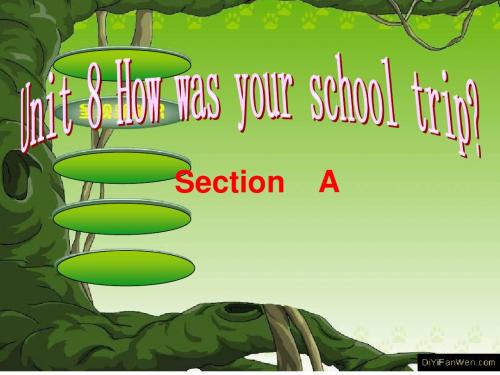
A: I visited Chicago.
B: Really? That sounds interesting. What did you see? A: Well, I…
Pairwork
Were there any …s in the aq
bus
4. The students watched a movie about dolphins. ×
5. The science teacher cleaned the bus. ×
The class moniter
sharks
Write down a list of places you visited and things you did there. Then make conversations using these phrases.
Grammar Focus
Did you go to the zoo? No, I didn’t. I went to the aquarium Did you see any Yes, I saw some seals seals? Were there any No, there weren’t any sharks? sharks.
Section
A
What did he/she/they do last weekend?
went fishing watched TV listened to music read a book
played soccer have (had) pizza surfed the Internet go(went) to the library
There be 句型的一般过去式的三种结构 肯定句 There was…∕There were…
八年级英语Unit 8 How was your school trip 人教版(新目标)知识精讲

初二英语Unit 8 How was your school trip? 人教版(新目标)【本讲教育信息】一. 教学内容:Unit 8 How was your school trip?一. 单元目标:1. 学习询问和谈论过去发生的事情。
2. 通过调查了解全班同学上周末的活动。
3. 通过描写“难忘的假日”,“秋游…”和日记摘抄,学习谈论过去发生的事情。
二. 语言结构:1. 规则动词和不规则动词的一般过去式。
2. 一般过去时的肯定句和否定句。
3. Did you, Were there引导的一般疑问句。
三. 重点词汇:1. aquarium n. 水族馆2. science center科学中心3. gift shop礼品商店4. seal n. 海豹5. shark n. 鲨鱼6. octopus n. 章鱼7. autograph n. 亲笔签名8. win v. 获胜,赢9. ate v. (eat的过去式)吃10. took v. (take的过去式)乘坐、花费11. hung out (hang out)外出12. got v. (get的过去式)得到13. go for a drive开车兜风14. sleep late 睡得晚15. yard sale 现场旧货出售16. day off 放假四. 重点短语:1. take photos 照相2. at the aquarium 在水族馆3. win a prize 获得奖品4. on the school trip 在学校旅行5. have a great time 玩得愉快6. watch a dolphin show 看一场海豚表演7. after that 那以后8. at the end of …在…结束在…末尾9. on the day off 在假日里10. all day 一整天11. e back from…在…回来五. 重难点解析:1. 复习一般过去时一般过去时态是谈论过去最常用的时态,它可以表示短暂而很快就完的动作和事情,时间较长的动作和状况以及重复发生的事情,句中通常有明确的一般过去时的时间状语。
初中英语《Unit8-How-was-your-school-trip》单元教学设计以及思维导图
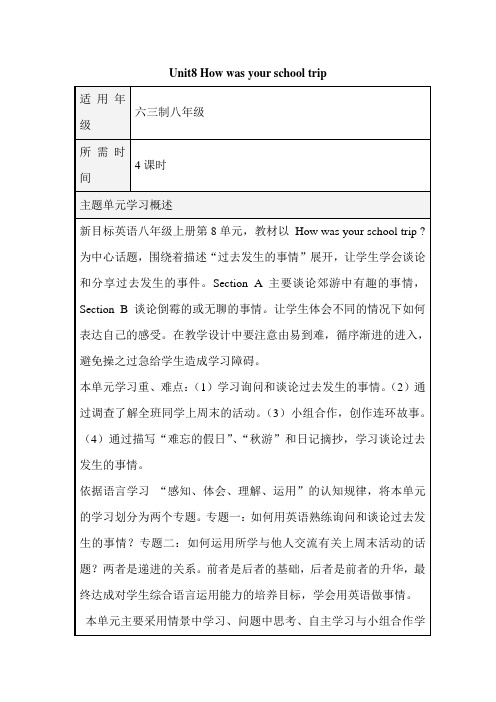
主题单元规划思维导图
主题单元学习目标
知识与技能:
1、能熟知单元主要内容,掌握相应的语言知识(单词、习惯用语、语法和功能用语)。
2、能结合所给任务,综合运用新、旧知识完成任务。
过程与方法:
1、能培养良好的听、说、读、写的能力,能运用适当的评价词对过去的学校旅行进行评价,能正确使用动词过去式对过去的活动进行准确的描述。
本单元学习重、难点:(1)学习询问和谈论过去发生的事情。(2)通过调查了解全班同学上周末的活动。(3)小组合作,创作连环故事。(4)通过描写“难忘的假日”、“秋游”和日记摘抄,学习谈论过去发生的事情。
依据语言学习“感知、体会、理解、运用”的认知规律,将本单元的学习划分为两个专题。专题一:如何用英语熟练询问和谈论过去发生的事情?专题二:如何运用所学与他人交流有关上周末活动的话题?两者是递进的关系。前者是后者的基础,后者是前者的升华,最终达成对学生综合语言运用能力的培养目标,学会用英语做事情。
学习策略:
1、搜集与一般过去时相关的资料图片;
2、相互交流自己的资料与课本资料,通过探究、模仿练习得出一般过去时的规律,达到熟练掌握与灵活运用的目的。
情感态度与价值观:
1、合理安排自己课外的学习、运动、休息、娱乐等活动形式,倡导过有意义的周末。要求学生保持愉快的心情,以积极的姿态,精神饱满地面对生活与学习。
本单元主要采用情景中学习、问题中思考、自主学习与小组合作学习相结合的学习方式。
本单元的预期学习成果:
1.听力任务完成后,学生能正确理解主要功能句的意义,模仿录音进行分角色朗读、背诵,并仿编对话。
2.根据3a阅读语篇任务所建构的篇章结构,在老师引领下,学生能对3a文段进行复述。
新目标八年级英语上册Unit 8 How was your school trip?讲解与练习
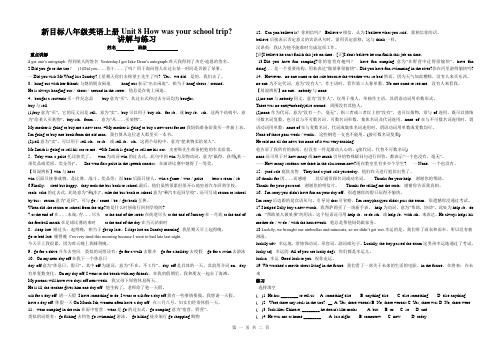
新目标八年级英语上册Unit 8 How was your school trip?讲解与练习姓名班级重点讲解1.get one‟s autograph 得到某人的签名Yesterday,I got Jake Dean‟s autograph.昨天我得到了杰克·迪恩的签名。
2.Did you go to the zoo?(1)Did you……你干……了吗?用于询问别人在过去某一时间是否做了某事。
一Did you visit Mr Wang last Sunday?上星期天你们去探望王先生了吗?--Yes,we did.是的,我们去了。
3.hung out with her friends与她的朋友闲逛hang out表示“出去闲逛”,相当于hang about/around。
He is always hanging out/about/around in the street.他总是在街上闲逛。
4.bought a souvenir买一件纪念品buy意为“买”,其过去式和过去分词均为bought。
buy与sell(1)buy意为“买”,它的反义词是sell,意为“卖”。
buy可以用于buy sth.for sb.或buy sb.sth.这两个结构中,意为“给某人买某物”。
buy sth.from...意为“从……买某物”。
My mother is going to buy me a new coat.=My mother is going to buy a new coat for me我妈妈准备给我买一件新上衣。
I'm going to buy one book from the old man.我打算从这位老人那里买一本书。
(2)sell意为“卖”,可以用于sell sth.to sb.或sell sb.sth.这两个结构中,意为“把某物卖给某人”。
Mr Smith is going to sell his car to me.=Mr Smith is going to sell me his car.史密斯先生准备把他的车卖给我。
Unit 8 How was your school trip

Unit 8 How was your school trip? 重要词组1. go to the aquariums去水族馆2. take photos照相,拍照3. hang out with sb.和某人闲逛4. buy a souvenir 买一件纪念品5. get his autograph 得到他的签名6. win a prize得奖7. win the first prize 获得一等奖8. a famous actor 一个出名的演员9. have a great time = have a good time= have fun玩得高兴10. on a school trip 在学校郊游11. go to Blue Water Aquarium蓝色水族馆12. visit the Visitors’Center参观游客中心13. watch a dolphin show 观看海豚表演14. after that 在那之后15. go to the Outdoor Pool 去户外泳池16. go to the Gift Shop 去礼品店17. take the bus back to school乘公共汽车回学校18. lots of=a lot of许多,大量19. at the end of 在……的尽头20. the class monitor 班长21. after the trip 郊游结束后22. day off休假日on my last day off 在我上一次休假日on my next day off 在我下个休假日23. go for a drive开车兜风24. help sb. do sth.帮助某人做某事help sb. with sth.25. take a class 上课26. sleep late 睡过头/懒床27. go camping in the rain 在雨中野营28. a busy day off 一个忙碌的休假日29. have fun (in) do ing sth. 做某事很开心30. rain all day 下了一整天的雨31. watch DVDs 观看DVDs32. have a yard sale 进行庭院旧货出售33. get wet 淋湿34. thanks for doing sth.谢某人做了某事35. win the first prize 获得一等奖36. in yesterday’s singing competition 在昨天的歌唱比赛中37. in the future 在未来重点句子1.How was your school trip?你的学校郊游怎么样?how 用于提问情况/状态2.Class 9 had a great time on the school trip.九班在学校郊游中玩得很开心。
人教版八年级英语上册知识点总结Unit8
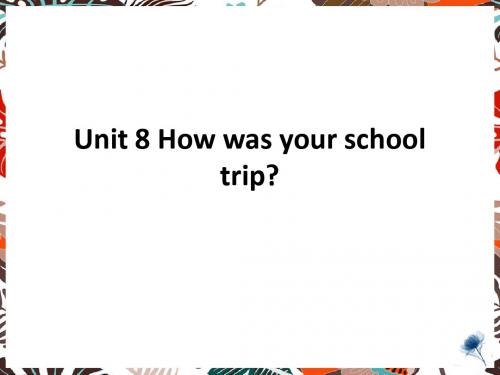
• (7)用作介词,表示事情发生的时间,用 在具体某一天前面。
• on a cold Sunday morning 周日上午
在一个寒冷的
• on May, 12th
在5月12日
• (8)用作介词,意为“关于;谈及”,含有 学术性。
• an essay on political economy 一篇政治经 济学方面的文章
• You must show your ticket at the barrier. 你必 须在检票处出示门票。
• 搭配: show sb. sth. = show sth.to sb. 把某 物给某人看
• Could you show me your photos? = Could you show your photos to me?
talk over 谈论 have a talk
have ice
go to the
• hang out with one’s friends 和朋友闲逛 buy a souvenir 买纪念品
• take photos=take a photo=take pictures=take a picture 照相
直工作,不休息。
• (2)用作副词,表示穿上、戴上(衣服、 鞋帽等)。
• Put your coat on. 穿上你的大衣。
• (3)用作副词,指(电器或电源)在接通或 使用中。
• The TV is always on in their house. 他们家电视 老是开着。
• (4)用作副词,指“(演出节目、戏剧等)在 进行中”。
• at the end of January 在1月底(表示时间)
• at the end of the street 在街道末端(表示 地点)
- 1、下载文档前请自行甄别文档内容的完整性,平台不提供额外的编辑、内容补充、找答案等附加服务。
- 2、"仅部分预览"的文档,不可在线预览部分如存在完整性等问题,可反馈申请退款(可完整预览的文档不适用该条件!)。
- 3、如文档侵犯您的权益,请联系客服反馈,我们会尽快为您处理(人工客服工作时间:9:00-18:30)。
Unit 8 How was your school trip一. 翻译下列词组:1. 昨天下午_________2. 前天_________3. 昨晚_________4. 上个月_________5. 去年夏天_________6. 看录像_________7. 整天_________8. 开车兜风_________9. 获得奖金_________ 10. 买纪念品_________二. 选择填空:1. After two hours the children got to the hill, tired _________ happy.A. andB. butC. althoughD. however2. Which team _________ the game yesterday?A. tookB. wantedC. visitedD. won3. _______ did you spend your vocation last summer?A. WhenB. WhoC. WhereD. What4. I went out and ________ in the river.A. swimB. swamC. swimmingD. to swim5. The music sounds _______, I like it very much.A. goodB. wellC. badD. beautifully6. I ________ late __________ class yesterday morning.A. was, forB. was, toC. am, forD. am, to7. -_______ did they play games?-For two hours.A. What timeB. WhenC. How longD. How often8. Tomorrow I have a day off, so I want to _______.A. take a classB. hang out with my friendsC. takes a classD. hangs out with my friends9. Class 4 went to the ________ to see some sharks.A. cinemaB. aquariumC. parkD. movie10. -When did you go to bed last night?-About 11 o’clock. I _______.A. slept earlyB. slept lateC. got up earlyD. get up early三. 按要求写出下列各词:1. visit________(过去式)2. photo________(复数)3. take________(反义词)4. put________(过去式)5. pour________(现在分词)6. win________(过去式)7. gift________(同义词)8. fun________(形容词)9. begin________(同义词)10. wild________(比较级) 11. athletic________(比较级)12. where________(同音词) 13. near________(反义词)14. leave________(过去式) 15. she________(名词性物主代词)16. sick________(同义词) 17. right________(同音词)18. foot________(复数)19. they________(宾格) 20. knife________(复数)四. 看图补全对话:Kevin: So, Tina, what 1 did you do?Tina: You won’t believe it, but I met Jake Dean!Kevin: Jack Dean, the famous actor?You really 2 him?Tina: Yes! He is making 3 movie at the aquarium.Kevin: Wow. Did you get his autograph?Tina: 4 , I didn’t. Laura did. But I took his photo. 5 it is. Kevin: Wow. 6 there other actors there?Tina: No. We 7 saw Jake. Look, here’s Toby. He 8 a prize in the 9 Shop. Kevin: Did you win that hat?Tina: No, I didn’t. I bought 10 .五. 连词组句:1. had, we, week, finally, school, day, this, from, a off____________________________________2. sandwich, do, turkey, how, you, a, make?____________________________________3. sale, no, weather, bad, one, because, came, was, the, the, to, so.____________________________________4. many, at, there, the, were, actors, aquarium____________________________________5. a, had, students, terrible, trip, school, the____________________________________六. 根据首字母提示拼写单词,完成下列短文。
Dear Tony,How was your day o____(1)? Did you have fun c______(2)?I didn’t have a very fun day. I visited my cousins. It rained all day. In the morning, I s__ (3)in the house and watched v¬¬______(4), played computer g______(5), and read. In the afternoon, Uncle Martin put some of his old things out in the y______(6)and had a yard sale! Unfortunately, it was kind of b______(7). No one came to the sale b______(8)the weather was so bad.See you soon.Nick七. 阅读理解:(A)You want to know about life in the past. Right? I can tell you. When I was a boy, things were different. I had to get up at six every morning. That was not very bad in summer, but in winter it was cold. And we didn’t have any hot water in the house. We had to wash in cold wate r. We didn’t have a bathroom(浴室). My dad had some chickens. I had to feed(喂养)them every morning and then I had to walk to school with my little sister. It was about two miles (英里)to school and about two miles back in the evening. But it always seemed longer in the morning when we wer e going to school. There was a bus, but we didn’t have any money. And we had to go to bed at eleven o’clock every night because I had too much homework and housework to do. We couldn’t watch TV because there wasn’t any. On Sundays we had to go to church (教堂)three times -morning, afternoon and evening. And we couldn’t play outside on Sundays. But it wasn’t all bad. We had some good times (时光). We could go out and our parents didn’t have to worry about us. There weren’t so many cars on the roads then, so the s treets were safe to play in. And there were not many robbers and thieves in those days. We had to work hard and we weren’t able to buy all those things in the shops today. Life was hard, but it was simple (单纯的)and people were happier. I don’t think I’d lik e to be young today.()1. The writer usually went to bed _________ every night.A. at sixB. at eightC. at nineD. at eleven()2. The writer walked about ________ every day.A. two milesB. three milesC. four milesD. five miles()3. Every morning the writer had to feed _______.A. his little sisterB. his lovely dogC. his chickensD. his father’s chickens()4. The writer had a _______ but _______ family.A. rich; happyB. poor; happyC. hard; poorD. rich; hard()5. Which of the following is NOT TRUE?A. The writer had a little sister.B. The writer couldn’t take the school bus.C. The writer and his sister never had any good timesD. The write had to get up at six(B)Once, when Tom was a boy, his mother went out for a picnic. Before she left, she said to him. “Tom, while I am away, stay near the door and watch it all the time! ”She said this because there were a lot of thieves in their town.Tom sat down beside the door. After an hour, one of his uncles came. He asked Tom, “Where’s your mother? ”“At a picnic, ”Tom answered. “Well, ”said his uncle. “We’re going to visit your house this evening. Go and tell your mother. ”His uncle then went away, and Tom began to think, “Mother said, ‘Watch the door well all the time! ’and uncle said, ‘Go and tell your mother. ’”He thought and thought, then, at last, he pulled the door down, put it on his back and went to his mother with it.根据短文内容判断正(T)误(F)。
